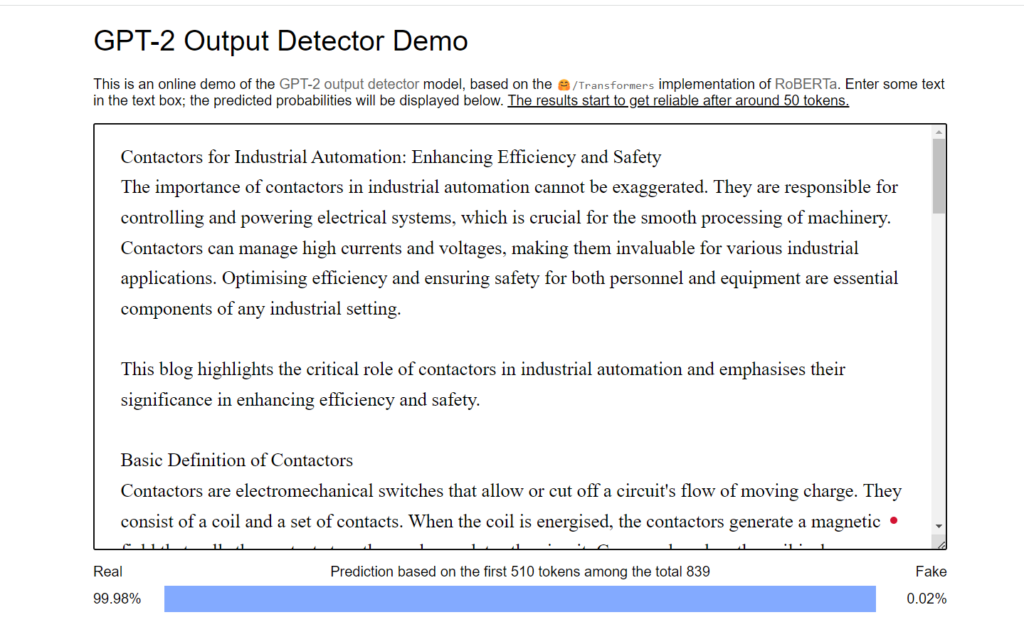The importance of contactors in industrial automation cannot be exaggerated. They are responsible for controlling and powering electrical systems, which is crucial for the smooth processing of machinery. Contactors can manage high currents and voltages, making them invaluable for various industrial applications. Optimising efficiency and ensuring safety for personnel and equipment are essential components of any industrial setting.
This blog highlights the critical role of contactors in industrial automation and emphasises their significance in enhancing efficiency and safety.
Basic Definition of Contactors
Contactors are electromechanical switches that allow or cut off a circuit’s flow of moving charge. They consist of a coil and a set of contacts. When the coil is energised, the contactors generate a magnetic field that pulls the contacts together and completes the circuit. Conversely, when the coil is de-energised, the contacts are pushed apart, and the circuit is broken. Now that we have discussed the basic definition of contactors let us look at their role in industrial automation.

The Role of Contactors in Industrial Automation
In the context of industrial automation, contactors have various essential roles. Here are some of the critical functions they perform:
- Efficient Power Management
Contactors are primarily used for power control in industrial settings. By controlling the flow of electricity, contactors enable the starting, stopping and regulation of motors, pumps, conveyors and other industrial machines. Their ability to handle high currents and voltages ensures smooth and reliable operation, preventing electrical overload and equipment failure.
Contactors act as intermediaries between control and power circuits, enabling efficient and safe power distribution.
- Increase Productivity
Contactors have a significant contribution to increasing the efficiency of industrial automation. They enable precise control and automation of processes, reducing manual intervention and minimising human error. Integration of contactors into automation systems simplifies industrial processes and increases productivity and output. Contactors also improve energy efficiency by enabling selective power distribution, ensuring power is delivered only to the necessary equipment.
4 Ways Contactors Ensure Electrical Safety
Contactors are crucial in protecting personnel, equipment, and overall system integrity in electrical systems. Here are some ways in which contactors ensure electrical system protection:
- Overload Protection: Contactors commonly include overload protection mechanisms, such as thermal or electronic overload relays. These mechanisms monitor the current passing through the contactor and cut off the power if the current exceeds a set threshold for a specific period. This ensures the safety of equipment and wiring by preventing overheating and avoiding any potential damage or fire hazards.
- Short Circuit Protection: Contactors are designed to handle short-circuit currents but may not be able to handle excessive current in the event of a severe short circuit. To protect electrical systems in such situations, contactors are often paired with fuses or circuit breakers. These protective equipments detect high current levels and quickly break the circuit, minimising damage caused by short circuits.
- Electrical Isolation: Contactors serve as a means of electrical isolation between the control circuit and the power circuit. This guarantees the safety of personnel working on the control circuit, preventing exposure to high voltage or current levels present in the circuit. This feature enables maintenance and repair work to be carried out securely.
- Emergency Stop Function: Contactors are commonly used to control motors or other high-power equipment. In critical situations such as an emergency or when personnel safety is at risk, contactors can be used as part of an emergency stop system. Activation of the emergency stop button cuts off power to the contactor, immediately shutting down the equipment and preventing further operation.
Contactors play a crucial role in improving efficiency and safety in industrial automation. To ensure you choose the best contactor for your industrial applications, it’s essential to collaborate with reputable electrical brands. These brands offer a variety of reliable contactors with features that meet specific industrial requirements. Collaborating with reputable brands guarantees that the contactor you choose is of high quality and compatible with your existing electrical infrastructure.
Sources
https://www.researchgate.net/publication/286915530_Conveyors
https://www.researchgate.net/publication/37723418_Short-Circuit_Currents
